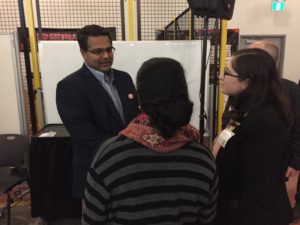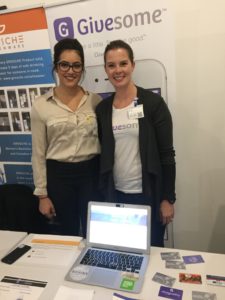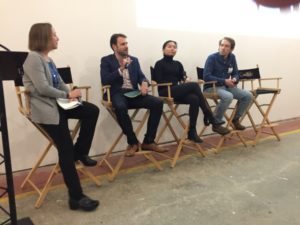|
Getting your Trinity Audio player ready...
|
Making a big profit is the cornerstone of any business.
But that doesn’t have to be the case, just ask Helmi Ansari. For the past decade Ansari, a former director at PepsiCo., and his wife Mehreen Sait have been making a difference by providing clean drinking water to thousands of people worldwide through their Cambridge-based company Grosche International Inc.
Just how the company – which sells teapots, infusion tea products, French presses for coffee, grinders, cups, all sorts of coffees, and tea and kitchen accessories – accomplished this in just a few short years was the focus of Ansari’s address at the Celebration of Social Enterprise.
The event, held Nov. 20 at Google Canada’s Community Space in Kitchener-Waterloo, was organized by the newly-formed LAICOS Enterprise Hub and provided more than 100 people involved in the region’s social enterprise world the chance to meet and network.
“The issue in our economic system today is quite often that people think you can either work on the planet or work on profit,” said Ansari. “What we were able to demonstrate in a large company (PepisCo.), and what we’re trying to do with our small business now is show that they actually go hand-in-hand.”
For about a decade, Grosche International Inc. has been installing water purification equipment throughout several regions, including South Sudan, Malawi, South India and the Philippines, providing at least 60 million days of safe drinking water.
This initiative is funded through a portion of sales from Grosche’s more than 150 products. These products are made worldwide, including China, Italy and Germany and are sold by retailers in about 20 countries, including Canada, the U.S., Europe, Australia, Japan, and South America.
This drive to ‘give back’ forms the core of any successful social enterprise, something LAICOS Enterprise Hub strives to promote and champion, without any funding. Besides Capacity Canada, the ‘Hub’ consists of a number of partners including CBaSE, Communitech, Innovation Guelph, Kindred Centre for Peace Advancement, Schlegel Centre for Entrepreneurship and Social Innovation, Small Business Centre Waterloo Region, St. Paul’s GreenHouse, Velocity Garage and Waterloo Wellington Local Health Integration Network.
“At some point, one would hope there doesn’t have to be a designation of social enterprise,” said Anne Toner Fung, executive director of Innovation Guelph. “At some point, one would hope that all enterprises are functioning for the greater good and at that point, you won’t need the designation of social enterprise.”
To expedite the process, LAICOS Enterprise Hub has brought together for-profit and non-profit partners to learn from each other and determine what gaps exist.
“Not-for-profits have been in the world of solving social problems and coming up with solutions forever and ever, so if anything it’s giving some heightened awareness to what not-for-profits have been doing for years,” said Capacity Canada’s Sandra Hanmer, referring to the two sectors working together.
“To be a successful not-for-profit, you have to first be a success at business.”
A panel discussion was also held at the event featuring representatives from several successful social enterprises.
“We’re all coming in under that banner of social impact,” said St. Paul’s GreenHouse Director Tania Del Matto, who moderated the panel.
Del Matto said in an interview the funding methods for non-profits have rapidly changed and the need for new sources means they must search for more enterprising ways to obtain funds. She used the creation of Habitat for Humanity’s ReStore venture as a prime example.
“The two sectors (for-profit and non-profit) are kind of converging in a way all under this banner of how do we do good and scale up the impact,” she said.
Wanting to make an impact is exactly what inspired Ansari about 12 years ago to start Gorsche International Inc. after he had a social awakening to the effects of climate change and the impact it is having on the world’s population.
“As a father, I neede
He said his focus has become weather, waste and water. Ansari joked how he began to sell loose-leaf tea door-to-door in his neighbourhood as a way to do his part. But his message of social responsibility, outside the corporate ‘norm’, came through very clear to those in attendance as he outlined Grosche’s mission statement.
“When we looked at growth, I said I want to be the opposite of everything I’ve been classically trained at being,” Ansari said, referring to the mindset he faced in the corporate world. “We just wanted to be a source of joy in the world. We wanted to be one of many trying to use their business to hopefully do the right thing.”
As their ‘laundry room’ company grew after a few short years, that right thing became clear after Ansari’s daughter was stricken with cholera during a family visit to Pakistan. She suffered severe dehydration and nearly died. The traumatic event left a lasting impression and led Ansari to become a champion for safe drinking water.
“People say we have to get people access to water. The truth is, everyone alive today has access to water, otherwise they would die in about 72 hours,” he said, adding the issue is whether or not the water is safe.
“Eight million people today don’t have access to clean drinking water.”
The Grosche: Safe Water Project was launched to help rectify that and centres around the installation of bio-sand filters made of cement and sand which have the capability to provide a family of 10 with clean water for up to 30 years. They are chemical free and the filters have no moving parts, so there are no maintenance issues.
“It’s a very low-tech way to save lives,” Ansari said.
The company is now a recognized B-Corporation and promotes a theory of what he calls CSV (Creating Shared Value), as opposed to the traditional CSR (Corporate Social Responsibility).
“With a little bit of thought and rethought, we can remake how we run our business and how we run our lives,” he said.
“We don’t have to sacrifice profit or growth. That is the message of B-corps. We can actually use power of for-profit business to be a positive change and make the world a better place.”

